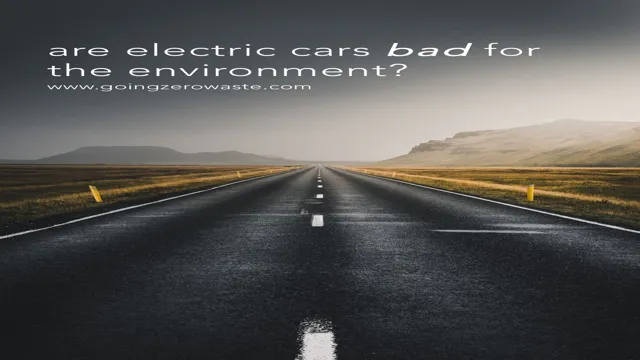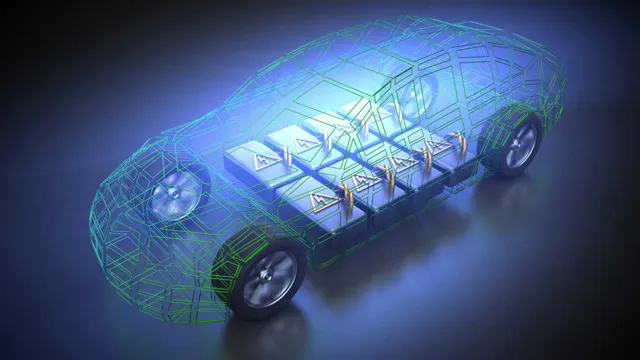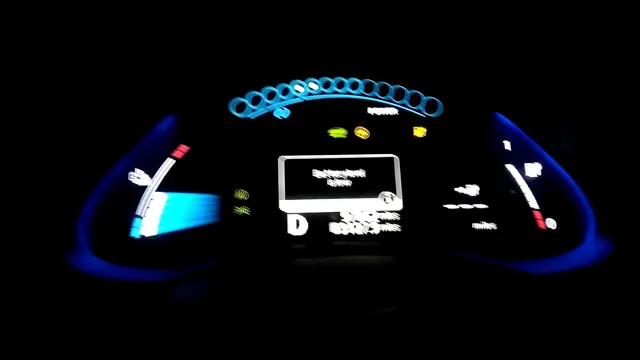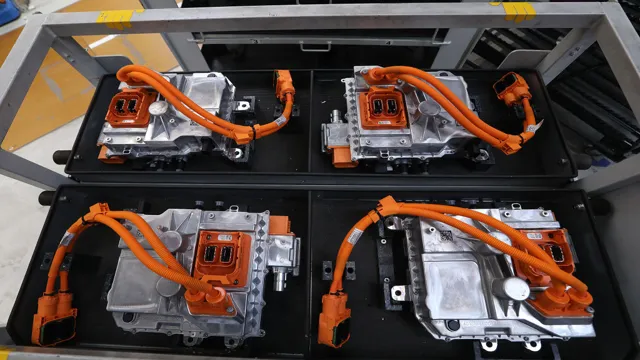The Dark Side of Electric Cars: Why Batteries are Threatening Our Environment
Electric cars are becoming more popular every passing year. With advancements in technology, the concept of electric cars is no longer a distant dream, but a reality. While many factors contribute to the growth of electric car production, the most important one is the development of electric car batteries.
Batteries are the driving force behind electric cars, and without their efficiency, electric cars would not be able to replace traditional fuel-powered vehicles efficiently. This blog post will delve into the nitty-gritty of electric car batteries and explore how they work, the different types of batteries, and their potential future advancements.
The Environmental Impact
There is no denying that electric vehicles (EVs) are better for the environment in terms of emissions during operation. However, the production and disposal of the batteries used in EVs can have a significant negative impact on the environment. The production of EV batteries requires a large amount of energy and resources, including rare earth metals like lithium and cobalt, which are often mined under hazardous and exploitative conditions.
Additionally, the disposal of EV batteries can pose a risk to the environment if not handled properly, as they contain toxic chemicals that can leach into the soil and water. While efforts are being made to improve the sustainability of EV battery production and disposal, it is important to consider all aspects of the environmental impact of electric cars when making the switch from traditional gasoline vehicles. Is the convenience of an EV worth the potential harm to the environment?
Carbon Footprint of Battery Production
The production of batteries has a significant environmental impact, which is mainly attributed to their carbon footprint. The carbon footprint of battery production refers to the amount of greenhouse gas emissions that are generated during the production process. These emissions are released due to the energy-intensive production methods that involve the extraction of raw materials, transportation, and manufacturing processes.
The main materials that are used in battery production, such as lithium and cobalt, are found in limited quantities in specific regions, which results in a higher carbon footprint due to the distance that the materials need to be transported. Despite the growing demand for electric vehicles and battery-powered electronics, there are concerns regarding the environmental cost of battery production and the sustainability of their supply chain. As a responsible consumer, it’s essential to consider the environmental impact of the products we use and promote sustainable practices in battery production to reduce their carbon footprint.

Battery Recycling and Reuse
Battery recycling and reuse are crucial in reducing our environmental impact. Batteries contain toxic chemicals such as lead, cadmium, and nickel that can contaminate the soil and water if not disposed of properly. Recycling these batteries ensures that their components are extracted and reused, reducing the demand for materials needed to make new batteries.
Additionally, recycling batteries can help prevent their toxic components from ending up in landfills, where they can release harmful gases and contribute to environmental pollution and climate change. In short, the act of recycling batteries is a simple yet powerful way we can all contribute to protecting the environment and creating a more sustainable future.
Benefits of Electric Cars
While it is true that batteries in electric cars can have negative impacts on the environment, the benefits of switching to electric vehicles far outweigh the drawbacks. A new study conducted by the European Environment Agency found that electric cars emit significantly less greenhouse gases over their lifetime than their gasoline-powered counterparts, even when taking into account the energy used to produce their batteries. Battery technology is rapidly improving, too, with many automakers pledging to source materials sustainably and reduce waste in the production process.
Additionally, electric cars don’t emit harmful pollutants into the air, which can have major health benefits for people living in densely populated urban areas. It’s important to consider the whole picture when it comes to the environmental impact of transportation, and electric cars are proving to be an increasingly viable solution.
Reduced Emissions and Air Pollution
Electric cars offer many benefits, one of which is reduced emissions and air pollution. By running on electricity, these cars emit zero tailpipe emissions, meaning they do not release harmful pollutants like nitrogen oxide or particulate matter into the air. This makes electric cars an excellent choice for those looking to reduce their carbon footprint and protect the environment.
In addition, electric cars can help improve air quality by reducing the amount of harmful pollutants produced by traditional cars. This is especially important in densely populated areas where air pollution can have a significant impact on public health. Overall, the benefits of electric cars are clear: they offer a cleaner and more sustainable way to get around while also helping to reduce emissions and improve air quality.
By making the switch to an electric car, individuals can take a step towards a greener future while also enjoying the many benefits of this innovative technology.
Energy Efficiency and Savings
Electric cars are becoming increasingly popular for several reasons, and one of the biggest benefits is their energy efficiency. Compared to traditional gasoline-powered cars, electric vehicles are much more efficient in converting energy into movement. This means that they require less power to travel the same distance, resulting in significant cost savings for drivers.
In addition, electric cars produce zero emissions, reducing the negative impact on the environment. By choosing an electric car, drivers not only save money on fuel costs, but also contribute to a healthier planet. Overall, the benefits of electric cars are clear – they offer greater energy efficiency, cost savings, and environmental sustainability, making them a smart choice for anyone in the market for a new car.
Renewable Energy Integration
Electric cars are one of the key components in integrating renewable energy into our transportation systems. Not only do they produce zero emissions, but they can also help alleviate the burden on our grid during peak demand hours. With the growth of renewable energy sources such as solar and wind power, electric cars can be charged using clean energy, becoming even more eco-friendly.
Additionally, electric cars reduce our dependence on fossil fuels and can help stabilize energy prices. As electric cars become more affordable and their driving ranges improve, they will become an even more appealing option for consumers looking to make a positive impact on the environment while also saving money in the long run. By combining renewable energy with electric cars, we can create a cleaner, more sustainable future for both ourselves and the planet.
Conclusion
In conclusion, the notion that batteries in electric cars are bad for the environment is not entirely accurate. While the production and disposal of these batteries do have some negative impacts, their long-term benefits in reducing greenhouse gas emissions far outweigh the environmental costs. It’s like choosing between eating a delicious but decadent dessert or a boring salad – yes, the dessert may not be the healthiest option, but indulging in it once in a while won’t undo all the good choices you make for your overall well-being.
Just like that, driving an electric car with batteries may not be a perfect solution, but it’s a step in the right direction towards a cleaner, healthier future for us all.”
Electric Cars’ Role in a Sustainable Future
Electric cars have become increasingly popular due to their numerous benefits, especially in promoting a sustainable future. One key advantage is that electric cars produce zero emissions, which significantly reduces their environmental impact compared to traditional gasoline vehicles. Additionally, they are typically more energy-efficient and require less maintenance, resulting in lower costs over time.
Another significant benefit is that electric cars offer a quieter and smoother driving experience, enhancing the overall driving pleasure for drivers and passengers alike. The use of electric vehicles can also reduce our dependence on fossil fuels and the volatility of global oil prices. All of these benefits make electric cars an attractive option for those looking to reduce their carbon footprint and promote a more sustainable future.
Addressing Battery Environmental Concerns
As electric cars become more popular, many people are concerned about the impact of their batteries on the environment. However, there are many benefits to electric cars that make them a smart choice for drivers. For one, electric cars produce zero emissions, which means they don’t contribute to air pollution or climate change.
Additionally, electric cars can save drivers money on fuel costs, as they require less energy to run than traditional gas-powered cars. With advancements in battery technology, electric cars are becoming more efficient than ever, meaning they can go farther on a single charge. While we still have work to do to make electric cars the norm, there is no doubt that they offer tangible benefits for both drivers and the planet.
FAQs
Why are batteries in electric cars bad for the environment?
Batteries in electric cars are bad for the environment because they require the extraction of rare earth metals, which can cause significant environmental damage. Additionally, the manufacturing process of electric car batteries generates a large carbon footprint.
How can we dispose of electric car batteries in an eco-friendly way?
There are several ways to dispose of electric car batteries in an eco-friendly way, such as recycling them, repurposing them for energy storage, or reducing the need by improving battery efficiency.
Are there any alternatives to batteries in electric cars?
Yes, there are alternative forms of energy storage for electric cars, such as hydrogen fuel cells or capacitors.
Do the environmental benefits of electric cars outweigh the negative impacts of batteries?
It depends on various factors, such as the source of electricity used to charge the batteries, the driving habits of the user, and the length of service of the battery. However, in general, electric cars are still more environmentally friendly than traditional gas-powered vehicles.




